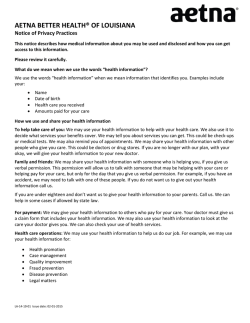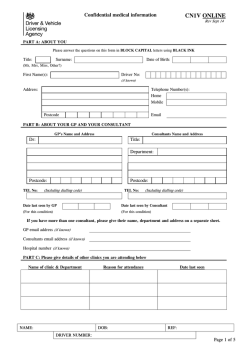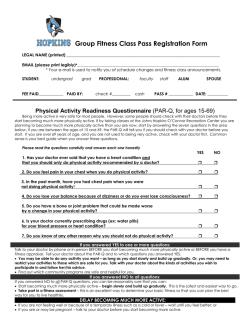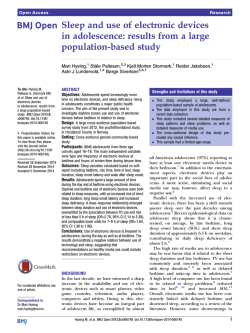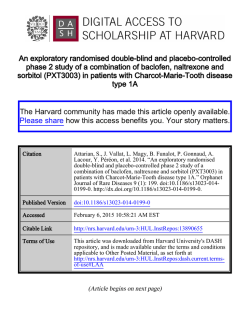
download brochure
Dimensions: 8.5inx11in Are you looking for a different option to treat your insomnia? BELSOMRA is a prescription medicine for adults who have trouble falling or staying asleep (insomnia). Selected Risk Information Do not take more BELSOMRA than prescribed. Do not take BELSOMRA unless you are able to stay in bed a full night (at least 7 hours) before you must be active again. For additional Selected Risk Information, please see page 10. Provided as an educational resource by Merck. BELSOMRA is a prescription medicine for adults who have trouble falling or staying asleep (insomnia). It is not known if BELSOMRA is safe and effective in children under the age of 18 years. Table of Contents Sleep and Wake Pathways . . . . . . . . . . . . . . . . . . . . . . . . . . . . . . . . . . . . . . . . . . . . . . . . . . . . . . . . . . . . . . . . . . . . . . . . . . . . . . . . . . . . . . 3 The Role of Orexin. . . . . . . . . . . . . . . . . . . . . . . . . . . . . . . . . . . . . . . . . . . . . . . . . . . . . . . . . . . . . . . . . . . . . . . . . . . . . . . . . . . . . . . . . . . . . 4 Falling Asleep and Staying Asleep With BELSOMRA . . . . . . . . . . . . . . . . . . . . . . . . . . . . . . . . . . . . . . . . . . . . . . . . . . . . . . . . . . . . . . . 4 Getting Started With BELSOMRA . . . . . . . . . . . . . . . . . . . . . . . . . . . . . . . . . . . . . . . . . . . . . . . . . . . . . . . . . . . . . . . . . . . . . . . . . . . . . . . . 5 Insomnia Checklist . . . . . . . . . . . . . . . . . . . . . . . . . . . . . . . . . . . . . . . . . . . . . . . . . . . . . . . . . . . . . . . . . . . . . . . . . . . . . . . . . . . . . . . . . . . . 7 Special Offers . . . . . . . . . . . . . . . . . . . . . . . . . . . . . . . . . . . . . . . . . . . . . . . . . . . . . . . . . . . . . . . . . . . . . . . . . . . . . . . . . . . . . . . . . . . . . . . . 7 Frequently Asked Questions (FAQs) . . . . . . . . . . . . . . . . . . . . . . . . . . . . . . . . . . . . . . . . . . . . . . . . . . . . . . . . . . . . . . . . . . . . . . . . . . . . . 8–9 Selected Risk Information . . . . . . . . . . . . . . . . . . . . . . . . . . . . . . . . . . . . . . . . . . . . . . . . . . . . . . . . . . . . . . . . . . . . . . . . . . . . . . . . . . . . . . 10 Summary . . . . . . . . . . . . . . . . . . . . . . . . . . . . . . . . . . . . . . . . . . . . . . . . . . . . . . . . . . . . . . . . . . . . . . . . . . . . . . . . . . . . . . . . . . . . . . . . . . . . 11 Selected Risk Information Do not take more BELSOMRA than prescribed. Do not take BELSOMRA unless you are able to stay in bed a full night (at least 7 hours) before you must be active again. Take BELSOMRA within 30 minutes of going to bed. For additional Selected Risk Information, please see page 10. Please read the Medication Guide and discuss it with your doctor. The physician Prescribing Information is also available. 2 Select links to access. Sleep and Wake Pathways Under Regular Conditions There are 2 pathways in your brain — a wake pathway and a sleep pathway. Each pathway has neurotransmitters that send signals to determine whether you are awake or asleep. Under regular conditions, sleep occurs when the wake neurotransmitters turn down and sleep neurotransmitters ramp up and take over, allowing you to fall asleep and stay asleep. There are many neurotransmitters in the wake and sleep pathways that work together to determine whether you are awake or asleep. Orexin is one of the wake neurotransmitters. Orexin is a central promoter of wakefulness. Orexin is a neurotransmitter that sends signals to other wake neurotransmitters to support their activity. Insomnia: Could It Be a Problem With Your Wake Pathway? Both wake and sleep pathways can play a role in insomnia. Insomnia can occur when your wake and sleep pathways don’t work well together. Science suggests insomnia can occur when your sleep neurotransmitters may be signaling your brain to sleep, but your wake neurotransmitters may not be turning down like they should. When this happens, it can be hard for your brain to transition from the “awake” mode. This may be contributing to your insomnia, and could help explain why you just aren’t getting as much sleep as you want. Talk to your doctor about what may be causing your insomnia. Selected Risk Information (continued) BELSOMRA may cause serious side effects that you may not know are happening to you. These side effects include: • sleepiness during the day • not thinking clearly • acting strangely, confused, or upset • “sleep-walking” or doing other activities when you are asleep like eating, talking, having sex, or driving a car. • Call your doctor right away if you find out that you have done any of these activities after taking BELSOMRA. Do not take BELSOMRA if you fall asleep often at unexpected times (narcolepsy). BELSOMRA is a controlled substance because it can be abused or cause dependence. For additional Selected Risk Information, please see page 10. Please read the Medication Guide and discuss it with your 3 doctor. The physician Prescribing Information is also available. Select links to access. Only BELSOMRA® (suvorexant) Targets and Inhibits the Action of Orexin Awake Mode Clinical Study Results BELSOMRA is FDA approved for adults who have trouble falling asleep (sleep onset) and staying asleep (sleep maintenance). In clinical studies, BELSOMRA demonstrated: Orexin Neurons BELSOMRA targets and inhibits the action of orexin. BELSOMRA is the only prescription sleep aid that targets and inhibits the action of orexin. Orexin is a central promoter of wakefulness. By inhibiting orexin, BELSOMRA is thought to help quiet the wake pathway. BELSOMRA Works Differently BELSOMRA specifically targets the action of orexin, one of the wake neurotransmitters. Only BELSOMRA works this way. Selected Risk Information (continued) Before taking BELSOMRA, tell your doctor about all of your medical conditions, including if you: People fell asleep faster and stayed asleep longer when using BELSOMRA compared to patients taking placebo. There was no evidence of physical dependence after prolonged use of BELSOMRA. There were no reported withdrawal symptoms after discontinuation. BELSOMRA is a federally controlled substance because it can be abused or cause dependence. Keep BELSOMRA in a safe place to prevent misuse and abuse. Selling or giving away BELSOMRA may harm others and is against the law. Tell your doctor if you have ever abused or have been dependent on alcohol, prescription medicines, or street drugs. Ask your doctor whether BELSOMRA can help you drift off to sleep and stay asleep. • have a history of depression, mental illness, or suicidal thoughts • have a history of drug or alcohol abuse or addiction • have a history of a sudden onset of muscle weakness (cataplexy) • have a history of falling asleep often at unexpected times (narcolepsy) or daytime sleepiness • have lung or breathing problems • have liver problems • are pregnant or plan to become pregnant • are breastfeeding or plan to breastfeed. For additional Selected Risk Information, please see page 10. Talk to your doctor about BELSOMRA, a sleep aid that works differently. Please read the Medication Guide and discuss it with your 4 doctor. The physician Prescribing Information is also available. Select links to access. Taking BEL SOMRA® (suvorexant) Take proactive steps to wind down and prepare your environment for sleep before you take BELSOMRA. Here are some important instructions you should follow when taking BELSOMRA: ...................................................... 1 Do not take more BELSOMRA than prescribed, and no more than once per night. ...................................................... 2 Take BELSOMRA before bed only if you have at least 7 hours to sleep before becoming active. ...................................................... 3 Take BELSOMRA within 30 minutes of going to bed. Selected Risk Information (continued) Do not drink alcohol while taking BELSOMRA. It can increase your chances of getting serious side effects. Do not drive, operate heavy machinery, do other dangerous activities, or do other activities that require clear thinking after taking BELSOMRA. You may still feel drowsy the next day after taking BELSOMRA. Do not drive or do other dangerous activities until you feel fully awake. ...................................................... How should I take BELSOMRA? Find the Right Dose With Your Doctor Your insomnia is as individual as you are. Because medicines work differently for different people, BELSOMRA is available in multiple strengths: ...................................................... 10 mg* The recommended dose is 10 mg.* ...................................................... 15 mg 20 mg ...................................................... Do not take BELSOMRA if you drank alcohol that evening or before bed. BELSOMRA may be taken with or without a meal. However, BELSOMRA may take longer to work if you take it with or right after meals. Call your doctor if your insomnia (sleep problem) worsens or is not better within 7 to 10 days. This may mean that there is another condition causing your sleep problem. Medicines can interact with each other, sometimes causing serious side effects. Do not take BELSOMRA with other medicines that can make you sleepy unless your doctor tells you to. For additional Selected Risk Information, please see page 10. Not actual size shown. For illustration purposes only. Only you know when you’re getting the sleep you need, so tell your doctor if you’re still not sleeping well with 10 mg.* If that happens, your doctor may suggest that you increase your dose to 15 mg or 20 mg if the 10-mg* dose is well tolerated. Always work with your doctor to find the dose that’s right for you. Do not take more than 20 mg of BELSOMRA in 1 day. *5 mg is the recommended dose for certain patients, and these patients should generally not exceed 10 mg. Please read the Medication Guide and discuss it with your 5 doctor. The physician Prescribing Information is also available. Select links to access. Are Your Sleep Habits Really Wake Habits? Are your sleep habits keeping you up? You may be unintentionally stimulating your “awake” mode and sending signals telling your brain to ramp up rather than wind down at bedtime. Take a quiz to get your Personalized Sleep Profile at belsomra.com, and receive customized tips with ways to help tackle the habits that come between you and your sleep. After you visit the website and get your sleep profile and customized tips, you can choose to take on the 10-Day Challenge to change your current habits and help move toward a better night’s sleep. Did You Know? The type of light, called blue light, emitted from electronic devices like your smartphone or tablet, may block your brain from producing a hormone that helps you to sleep. Try turning off electronics at least 1 hour before going to bed. Take the first step. Take your Personalized Sleep Profile quiz at belsomra.com. For Selected Risk Information, please see page 10. Please read the Medication Guide and discuss it with your 7 6 doctor. The physician Prescribing Information is also available. Select links to access. Get Answers to Questions on Sleep Special Offers for Eligible Patients* There are things your doctor needs to know to assess the extent and impact of your insomnia. Your doctor will need to know how many hours you are sleeping and the specific symptoms you’re having. Fill out the checklist below and share your answers with your doctor at your next appointment. The better your conversation with your doctor, the sooner your doctor can help you find a way to improve your sleep. ...................................................... How many hours of sleep do you get when you have trouble sleeping (total sleep time)? HOURS ...................................................... How many nights per week do NIGHTS you have trouble sleeping? ...................................................... Do you have trouble falling asleep? YES NO ...................................................... Do you have trouble staying asleep? YES NO ...................................................... Do you consistently wake up much earlier than you want to? YES NO Special offers are available for eligible patients prescribed BELSOMRA® (suvorexant).* Visit belsomra.com where you can learn more. *Not all patients are eligible. Terms and conditions and restrictions apply. Selected Risk Information (continued) BELSOMRA may cause serious side effects, including: • abnormal thoughts and behavior. Symptoms include more outgoing or aggressive behavior than normal, confusion, agitation, hallucinations, worsening of depression, and suicidal thoughts or actions • memory loss • anxiety • temporary inability to move or talk (sleep paralysis) for up to several minutes while you are going to sleep or waking up • temporary weakness in your legs that can happen during the day or at night. The most common side effects of BELSOMRA include drowsiness the next day after you take BELSOMRA. For additional Selected Risk Information, please see page 10. ...................................................... What parts of your life are impacted by your lack of sleep? Talk to your doctor or visit belsomra.com for more information. Fill out the checklist above, then talk to your doctor about your specific symptoms. Please read the Medication Guide and discuss it with your 7 doctor. The physician Prescribing Information is also available. Select links to access. Frequently Asked Questions (FAQs) Here are a few of the most commonly asked questions when it comes to insomnia and BELSOMRA. About BELSOMRA® (suvorexant) Q Is BELSOMRA FDA approved? A Yes. BELSOMRA is an FDA-approved prescription medicine for adults who have trouble falling asleep and/or staying asleep (insomnia). ..................................................... Q How is BELSOMRA different? A BELSOMRA specifically targets the action of orexin, one of the wake neurotransmitters. Only BELSOMRA works this way. ..................................................... Q How likely am I to feel drowsy the next morning? A In clinical trials, 7% of patients taking BELSOMRA 15 mg or 20 mg reported somnolence (next-day drowsiness) compared to 3% of patients taking placebo. You may still feel drowsy the next day after taking BELSOMRA. Do not drive or do other dangerous activities until you feel fully awake. ...................................................... Q What are the possible side effects of BELSOMRA? A BELSOMRA has possible side effects. Before you begin treatment, it’s important to know what these side effects are and to discuss the risks and benefits of taking BELSOMRA with your doctor. BELSOMRA may cause serious side effects that you may not know are happening to you. These side effects include: sleepiness during the day Q What is orexin? A Orexin is a central promoter of wakefulness. Orexin is a neurotransmitter that sends signals to other wake neurotransmitters to support their activity. not thinking clearly acting strangely, confused, or upset ..................................................... Q When do I take BELSOMRA? A You should take BELSOMRA 1 time each night, if needed, within 30 minutes of going to bed and only when you can get a full night’s sleep (at least 7 hours). ..................................................... Q Is it best to take BELSOMRA with or without food? A BELSOMRA may be taken with or without a meal. However, BELSOMRA may take longer to work if you take it with or right after meals. “sleep-walking” or doing other activities when you are asleep like eating, talking, having sex, or driving a car. Call your doctor right away if you find out that you have done any of the above activities after taking BELSOMRA. Below is a list of the most commonly reported adverse events that occurred in 3-month clinical trials: placebo (n=767) BELSOMRA 15 mg or 20 mg (n=493) Diarrhea . . . . . . . . . . . . . (placebo 1%, BELSOMRA 2%) Dry mouth . . . . . . . . . . . (placebo 1%, BELSOMRA 2%) Upper respiratory tract infection . . . . . . . . (placebo 1%, BELSOMRA 2%) Headache . . . . . . . . . . . . (placebo 6%, BELSOMRA 7%) ..................................................... Next-day drowsiness . . (placebo 3%, BELSOMRA 7%) For Selected Risk Information, please see page 10. Dizziness . . . . . . . . . . . . (placebo 2%, BELSOMRA 3%) Abnormal dreams . . . . . (placebo 1%, BELSOMRA 2%) Cough . . . . . . . . . . . . . . . (placebo 1%, BELSOMRA 2%) Please read the Medication Guide and discuss it with your 9 8 doctor. The physician Prescribing Information is also available. Select links to access. Frequently Asked Questions (FAQs) (continued) What to Expect With BELSOMRA® (suvorexant) Q What is the right dose for me? A Because medicines work differently for different people, BELSOMRA is available in multiple strengths. The recommended dose is 10 mg.* Only you know when you’re getting the sleep you need, so tell your doctor if you’re still not sleeping well with 10 mg.* If that happens, your doctor may suggest that you increase your dose to 15 mg or 20 mg if the 10-mg* dose is well tolerated. Always work with your doctor to find the dose that’s right for you. Do not take more than 20 mg of BELSOMRA in 1 day. *5 mg is the recommended dose for certain patients, and these patients should generally not exceed 10 mg. ...................................................... Q What happens when patients stop taking BELSOMRA? A In clinical trials, there was no evidence of physical dependence with the prolonged use of BELSOMRA. There were no reported withdrawal symptoms after discontinuation. BELSOMRA is a federally controlled substance because it can be abused or cause dependence. Keep BELSOMRA in a safe place to prevent misuse and abuse. Selling or giving away BELSOMRA may harm others and is against the law. Tell your doctor if you have ever abused or have been dependent on alcohol, prescription medicines, or street drugs. ...................................................... If you are struggling to fall asleep or stay asleep, ask your doctor about BELSOMRA. Selected Risk Information (continued) How should I take BELSOMRA? Take BELSOMRA exactly as your doctor tells you to take it. Only take BELSOMRA 1 time each night, if needed, within 30 minutes of going to bed. Only take BELSOMRA when you can get a full night’s sleep (at least 7 hours). Do not take BELSOMRA if you drank alcohol that evening or before bed. BELSOMRA may be taken with or without a meal. However, BELSOMRA may take longer to work if you take it with or right after meals. Call your doctor if your insomnia (sleep problem) worsens or is not better within 7 to 10 days. This may mean that there is another condition causing your sleep problem. If you take too much BELSOMRA, call your doctor or get emergency treatment. Medicines can interact with each other, sometimes causing serious side effects. Do not take BELSOMRA with other medicines that can make you sleepy unless your doctor tells you to. For additional Selected Risk Information, please see page 10. Please read the Medication Guide and discuss it with your 9 doctor. The physician Prescribing Information is also available. Select links to access. What is BELSOMRA® (suvorexant)? BELSOMRA is a prescription medicine for adults who have trouble falling or staying asleep (insomnia). It is not known if BELSOMRA is safe and effective in children under the age of 18 years. • have lung or breathing problems • have liver problems • are pregnant or plan to become pregnant • are breastfeeding or plan to breastfeed. Selected Risk Information Do not take more BELSOMRA than prescribed. Medicines can interact with each other, sometimes causing serious side effects. Do not take BELSOMRA with other medicines that can make you sleepy unless your doctor tells you to. Do not take BELSOMRA unless you are able to stay in bed a full night (at least 7 hours) before you must be active again. Do not drink alcohol while taking BELSOMRA. It can increase your chances of getting serious side effects. Take BELSOMRA within 30 minutes of going to bed. Do not drive, operate heavy machinery, do other dangerous activities, or do other activities that require clear thinking after taking BELSOMRA. BELSOMRA may cause serious side effects that you may not know are happening to you. These side effects include: • sleepiness during the day You may still feel drowsy the next day after taking BELSOMRA. Do not drive or do other dangerous activities until you feel fully awake. • not thinking clearly • acting strangely, confused, or upset • “sleep-walking” or doing other activities when you are asleep like eating, talking, having sex, or driving a car. • Call your doctor right away if you find out that you have done any of these activities after taking BELSOMRA. BELSOMRA may cause serious side effects, including: • abnormal thoughts and behavior. Symptoms include more outgoing or aggressive behavior than normal, confusion, agitation, hallucinations, worsening of depression, and suicidal thoughts or actions • memory loss • anxiety Do not take BELSOMRA if you fall asleep often at unexpected times (narcolepsy). BELSOMRA is a controlled substance because it can be abused or cause dependence. Before taking BELSOMRA, tell your doctor about all of your medical conditions, including if you: • have a history of depression, mental illness, or suicidal thoughts • temporary inability to move or talk (sleep paralysis) for up to several minutes while you are going to sleep or waking up • temporary weakness in your legs that can happen during the day or at night. The most common side effects of BELSOMRA include drowsiness the next day after you take BELSOMRA. • have a history of drug or alcohol abuse or addiction • have a history of a sudden onset of muscle weakness (cataplexy) • have a history of falling asleep often at unexpected times (narcolepsy) or daytime sleepiness Please read the Medication Guide and discuss it with your 10 11 doctor. The physician Prescribing Information is also available. Select links to access. BELSOMRA is a prescription medicine for adults who have trouble falling or staying asleep (insomnia). BELSOMRA—A Different Way to Treat Insomnia The only prescription sleep aid that targets and inhibits the action of orexin. - BELSOMRA specifically targets the action of orexin, one of the wake neurotransmitters. - Orexin is a central promoter of wakefulness. - By inhibiting orexin, BELSOMRA is thought to help quiet the wake pathway. BELSOMRA is FDA approved for adults who have trouble falling asleep and staying asleep. BELSOMRA is available in multiple doses — 10 mg,* 15 mg, and 20 mg. - The recommended dose is 10 mg. - Your insomnia is as individual as you are. Because medicines work differently for different people, always work with your doctor to find the dose that’s right for you. *5 mg is the recommended dose for certain patients, and these patients should generally not exceed 10 mg. Selected Risk Information Do not take more BELSOMRA than prescribed. Do not take BELSOMRA unless you are able to stay in bed a full night (at least 7 hours) before you must be active again. Take BELSOMRA within 30 minutes of going to bed. For additional Selected Risk Information, please see page 10. Questions about BELSOMRA? Call 844-BELSOMRA for more information. Copyright © 2014 Merck Sharp & Dohme Corp., a subsidiary of Merck & Co., Inc. All rights reserved. NEUR-1114666-0000 12/14 11 Please read the Medication Guide and discuss it with your doctor. The physician Prescribing Information is also available. Select links to access.
© Copyright 2026



